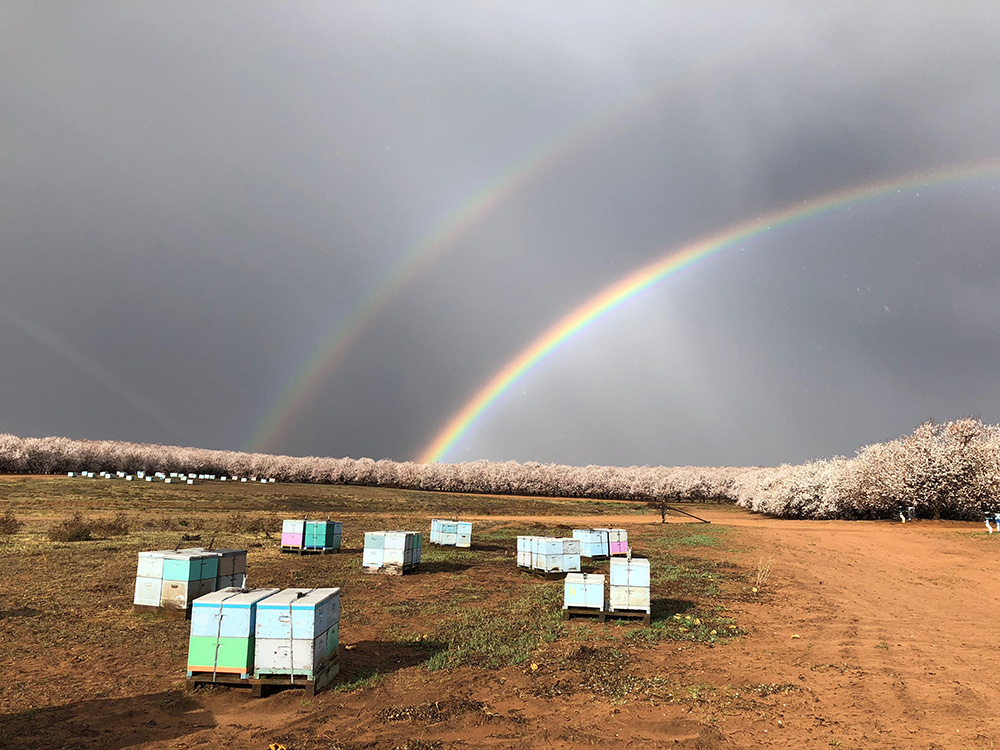Largest livestock movement commences with the start of pollination season
26 July 2021Billions of honey bees are this week hitting the road to the almond orchards of Victoria in what is a critical annual pilgrimage to support not only farmers but also lovers of the healthy and delicious nut.

Australia’s almond industry relies wholly on honey bees for pollination and will require around 277,000 hives this season, which will be driven to orchards on trucks by commercial beekeepers like Peter McDonald. In doing so, Mr McDonald and his fellow beekeepers will help to facilitate the largest annual livestock movement in the country.
Mr McDonald said consumers may not be entirely aware of the integral role the humble honey bee plays in the food security of the nation.
“The almond pollination season has become one of the most important times of the year for the bee industry,” Mr McDonald said.
”Not only does it give us a good cash flow into our businesses, but it also helps to build our hives strength back up after the off season.
“Forty years ago, there wasn’t much demand for pollination services and only a small number of beekeepers were involved, but with changes in diets and increased production of some crops, including almonds, the demand is now so great it requires beekeepers from all over Australia to travel to meet the needs of the food production system.”
The almond flowering season begins in late July and continues for around six weeks. The winter chill encourages the trees to burst into bloom with flowers, which are then cross-pollinated by honey bees moving pollen throughout the orchard.
Australian Honey Bee Industry Council (AHBIC) Chair, Trevor Weatherhead, said the almond pollination season was an essential time of year for his industry given it allowed beekeepers to diversify their income away from exclusively producing honey.
“Honey bee pollination is not just important for food production, it is also an in-demand service that supports many beekeepers to sustainably and profitably grow their businesses,”.
“Research has shown almonds to be a very healthy food and demand is growing, both here and in worldwide markets, because of the nutritional benefits they bring.
“This is exciting for the honey bee industry given honey bees are absolutely critical to growing the nuts on the trees in the first place.”
Mr Weatherhead said the importance of honey bees extended well beyond just almonds and to the production of many other nutritious and popular foods eaten each day by Australian and international consumers.
“Honey bees are important to more crops than just almonds, with one in three of the mouthfuls of food consumed in this nation relying on pollination services,” he said.
“Furthermore, the honey bee industry contributes an estimated $14.2 billion annually to the Australian economy through the pollination of crops yielding healthy and nutritious food including avocadoes, almonds, macadamias, pumpkins, watermelons and apples.”
Like many Australians who have tried to travel across the country over the past year, Mr McDonald said border restrictions will be a consideration for beekeepers during the migration of the honey bees this season.
“COVID-19 is an additional complication we all have to deal with,” he said.
“We’re a recognised essential service, so we’re still able to go and work the bees, but we have to be very aware of different restrictions – and there is now the additional requirement of COVID-19 testing every three days.”
But once the bees arrive at the orchards, he expects the additional logistical challenges will be worthwhile.
“The bees get very excited when they get to the almonds, it’s like the Garden of Eden for them!”
